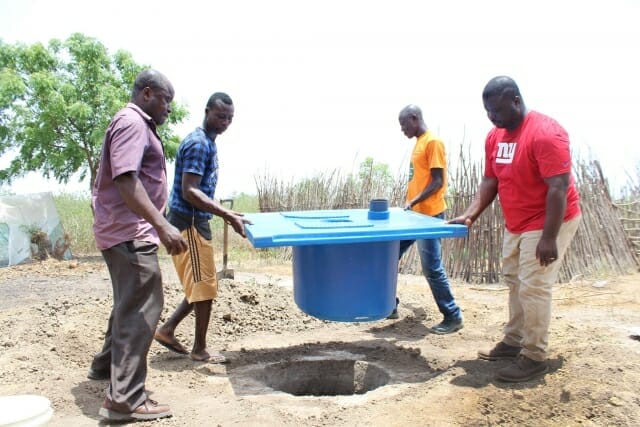News > Blog
Global Communities at UNC Water & Health Conference
Published 09/30/2019 by Global Communities

The 2019 Water and Health Conference: Where Science Meets Policy, organized by the Water Institute at UNC explores drinking water supply, sanitation, hygiene and water resources in both the developing and developed worlds with a strong public health emphasis. The conference will take place in Chapel Hill, North Carolina on October 7-11, 2019.
Click here for registration and more info on the event.
Global Communities will have representatives speaking at the following sessions:
Monday, October 7
8:30am-10:00am: Planning for Success: Context-specific Programming for Rural Sanitation
Side Event Convened by: USAID/WASHPaLS, Global Communities, UNICEF, WSSCC/GSF
In their 2008 Handbook on Community-Led Total Sanitation, Kamal Kar and Robert Chambers identified a set of conditions that were posited to be associated with CLTS program success, conditions that were a reflection of implementer experience. With another decade of documented CLTS implementation experience to work with, USAID’s Water, Sanitation, and Hygiene Partnerships and Learning for Sustainability (WASHPaLS) project is examining the drivers of CLTS success (the so-called “performance envelope”) via a systematic, coupled quantitative-qualitative analysis. This proposed side event will examine the lessons of that research experience.
Presenters include Alberto Wilde and Dominic Osei from Global Communities Ghana
2:30pm: Improving Outcomes for Girls through a Holistic MHM Approach: Evidence from the USAID Ghana WASH for Health project
Verbal Presentation by: Audrey Anderson, COO, Be Girl; Alberto Wilde and Sarah Goddard, Global Communities
In partnership with the Ghana education service and the social enterprise Be Girl and as part of the USAID WASH for Health project, Global Communities implemented an MHM pilot program to assess the impact of having access to reusable menstrual panties and a menstrual cycle tracking device (the SmartCycle®) accompanied by basic menstruation education. The pilot highlights that: 1) MHM education is important for boys and girls in primary and secondary school to reduce harmful social norms and stigma around menstruation; 2) Special messaging should target adults and traditional leaders to reform detrimental norms and taboos; and 3) MHM materials, including Be Girl menstrual kits, should be made available in schools in order to increase girls’ capacity to manage menstruation safely and comfortably, thus reducing barriers to accessing a quality education, contributing to socio-economic progress, and making progress toward sustainable development.
Wednesday, October 9
5:00pm: A Behavior Change Strategy for the Integration of Nutrition-sensitive WASH Behaviors
Poster Presentation by: Rebecca Wener, representing Lynne Cogswell of The Manoff Group
This poster presentation documents the experience of the Ghana WASH for Health (W4H) project, a five-year USAID-supported project led by Global Communities with technical support for behavior change from The Manoff Group, to develop an integrated behavior change strategy for the adoption of nutrition-sensitive WASH behaviors. W4H’s goal is to accelerate sustainable improvement in water and sanitation access and in hygiene behaviors in 30 districts across Ghana. During the first two years of the program, the W4H behavior change and communication team developed a comprehensive communications package on key WASH behaviors for district- and community-level workers. With this strong WASH behavior change foundation in place, W4H chose to strengthen this package by integrating a set of nutrition-sensitive WASH behaviors that go beyond the customary WASH practices to include those that can reduce stunting in children under two. These evidence-based, prioritized behaviors include the creation of clean play and eating spaces, washing hands, exclusive breastfeeding for the first six months, and safe handling of food for children under two. The resulting behavior change strategy, which has been developed and disseminated to W4H staff working across Ghana, is grounded in a behavior integration approach that identifies all elements required to allow a primary actor to adopt the desired behaviors. Implementation of this strategy is ongoing and represents an opportunity to make substantial gains in sanitation and nutritional priorities.
Thursday, October 10
8:30am-10:00am: Reaching the Poor and Leaving No One Behind in Sanitation
Side Event Convened by: Global Communities, USAID and the World Bank
This side event will bring together evidence and concrete cases of programs that reach poor households and communities with sanitation. Cases will be presented from Indonesia and Ghana and in addition, findings from recent research on subsidies and targeting the poor from the WB and the USAID WASHPALS project will be shared. Session include: (1) Doing More with Less – Smarter Subsidies for Sanitation – this presentation will present the findings of a recent World Bank research study on WSS subsides around the world; (2) In partnership with UNICEF, USAID/WASHPaLS is conducting a cluster randomized controlled trial of partial subsidies for toilets, targeted at the most vulnerable households in rural communities that have been previously declared ODF – this side session will share the results of the baseline; (3) as part of the USAID Ghana WASH for Health project, Global Communities will share how the government of Ghana addressed evidence that the CLTS approach was not providing durable and sustainable sanitation solutions for the poor and then worked with development partners and Ghanaian local government stakeholders to change their policy to allow for subsidies for rural sanitation and how they then worked with the private sector to develop lower costs hygienic sanitation facilities and; (4) the USAID Indonesia Urban Water, Sanitation, and Hygiene Plus project has targets to support city government and service providers to reach populations in the bottom 40% by wealth. In this session, we will share how, in order to understand and accomplish this objective, USAID/IUWASH PLUS has partnered with local government on innovative targeting and verification systems for the B40.




